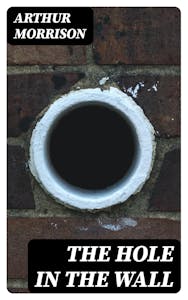Arthur Morrison's 'The Hole in the Wall' is a gripping and atmospheric novella set in the seedy underbelly of London's East End. Published in 1902, the book is a prime example of late Victorian sensationalist literature, exploring themes of crime, poverty, and urban decay. Morrison's vivid descriptions and colloquial dialogue immerse the reader in the gritty world of thieves and beggars, creating a sense of unease and tension throughout the narrative. Arthur Morrison, a journalist and writer, drew inspiration for 'The Hole in the Wall' from his experiences documenting the impoverished neighborhoods of London. His firsthand encounters with crime and destitution lent an authenticity to the novel, making it a powerful social commentary on the harsh realities of the time. Morrison's background in journalism is evident in his meticulous attention to detail and his ability to portray the complexities of the human condition. I highly recommend 'The Hole in the Wall' to readers interested in late Victorian literature, crime fiction, and social history. Morrison's gripping tale of survival and desperation is a compelling read that sheds light on the darker aspects of society during this period.
